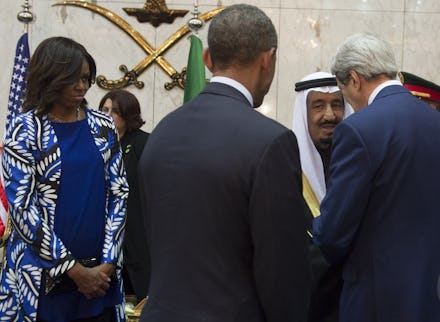5 Photos of Michelle Obama That Say What the President Won't About Saudi Arabia

First lady Michelle Obama may be the only resident of the White House showing the Saudi royal family the respect it deserves.
When President Barack Obama and the first lady departed New Delhi for an Air Force One flight to Riyadh in order to pay respects to the late King Abdullah, the first lady, wearing a knee-length black floral dress, was all smiles. Upon arriving in Saudi Arabia, however, she had swapped out her apparel for something that catered more to the House of Saud's medieval sensibilities — and her smile for a grimace.
That still wasn't good enough for Michelle Obama's Saudi hosts. Upon arrival, President Obama and the first lady were greeted by the new King Salman, Abdullah's anti-reformist brother, and an all-male group of royal delegates, most of whom could not bring themselves to even nod in the first lady's direction, much less shake her hand. Although ABC News hope-listicled a gallery of Michelle Obama's appearances in Riyadh, which "embod[ied] some of the reforms that her husband is pushing the country to adopt," the first lady was still relegated to standing mutely behind her husband.
She doesn't look pleased — and why should she?
For Saudi Arabia's extremist rulers and their benefactors, Michelle Obama's silent deference to every person in the room with a penis still wasn't good enough. The first lady, a graduate of Princeton University and Harvard Law School, was widely criticized by Saudis and the Arab world on social media with an Arabic hashtag, loosely translated as #Michelle_Obama_Immodest, for not covering her hair. Tweets gathered by Al-Ahram, Egypt's largest daily newspaper, show Saudi outrage that the first lady wore a headscarf to visit a mosque in Indonesia, as well as a lace mantilla to meet Pope Francis in Vatican City, and yet remained uncovered in Riyadh.
Under the kingdom's atavistic dress code, Saudi women, who are legally considered closer to property than persons, are required to wear a headscarf and an abaya, a loose-fitting, full-length robe, in public. Many women go much further, covering their hair and face with a thick black veil known as a niqab. Foreign women, however, are not required to wear headscarves, as demonstrated by both former Secretary of State Condoleezza Rice and House Minority Leader Nancy Pelosi in their own sartorial choices on the condolence trip.
Michelle Obama had previously gotten compliments for her "fashion diplomacy," if you can call limiting a woman's role in international affairs to what kind of skirt she wears a "compliment."
Michelle Obama's silence still speaks louder than President Obama's platitudes. When meeting with King Salman for the first time, President Obama declined to bring up Saudi Arabia's human rights record (or lack thereof) despite urging by Amnesty International and other human rights organizations following the public flogging of Raif Badawi, a Saudi blogger sentenced to 1,000 lashes and 10 years in prison for speaking critically about Islam.
In an interview with CNN, President Obama described the importance of "balance" in the U.S.-Saudi relationship: "Sometimes we have to balance our need to speak to them about human rights issues with immediate concerns that we have in terms of countering terrorism or dealing with regional stability." Also, oil.
The president's silence came only hours after he told an audience in India that "[e]very person has the right to practice their religion and beliefs and not practice it if they choose so without any persecution," and that "every girl's life matters. Every daughter deserves the same chance as our sons. Every woman should be able to go about her day ... and be safe and be treated with the respect and dignity that she deserves."
Except, apparently, the first lady of the United States.
Her clothing shouldn't be her final word on Saudi Arabia and women's rights. Previous first ladies have used increasingly less coded language to publicly pressure Saudi Arabia and other nations with de jure policies of state-sponsored misogyny to treat their female citizens like human beings. In 1995, Hillary Clinton's iconic speech at the U.N.'s Fourth World Conference on Women in Beijing declared that "women's rights are human rights, and human rights are women's rights." A decade later at the World Economic Forum in Jordan, Laura Bush told a largely Arab audience that "freedom, especially freedom for women, is more than the absence of oppression. It's the right to speak and vote and worship freely. Human rights require the rights of women. And human rights are empty promises without human liberty." Of course, the Saudi delegation walked out before the first lady reached that point in her speech.
"Women who have not yet won these rights," Bush continued, "are watching."